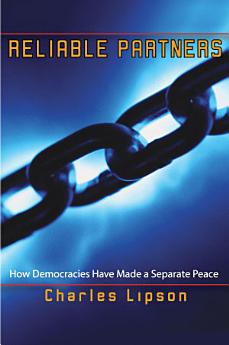Reliable Partners: How Democracies Have Made a Separate Peace
Dec 2013 · Princeton University Press
Ebook
272
Pages
family_home
Eligible
info
reportRatings and reviews aren’t verified Learn More
About this ebook
Democracies often go to war but almost never against each other. Indeed, "the democratic peace" has become a catchphrase among scholars and even U.S. Presidents. But why do democracies avoid fighting each other? Reliable Partners offers the first systematic and definitive explanation. Examining decades of research and speculation on the subject and testing this against the history of relations between democracies over the last two centuries, Charles Lipson concludes that constitutional democracies have a "contracting advantage"--a unique ability to settle conflicts with each other by durable agreements. In so doing he forcefully counters realist claims that a regime's character is irrelevant to war and peace. Lipson argues that because democracies are confident their bargains will stick, they can negotiate effective settlements with each other rather than incur the great costs of war.
Why are democracies more reliable partners? Because their politics are uniquely open to outside scrutiny and facilitate long-term commitments. They cannot easily bluff, deceive, or launch surprise attacks. While this transparency weakens their bargaining position, it also makes their promises more credible--and more durable, for democracies are generally stable. Their leaders are constrained by constitutional rules, independent officials, and the political costs of abandoning public commitments. All this allows for solid bargains between democracies. When democracies contemplate breaking their agreements, their open debate gives partners advance notice and a chance to protect themselves. Hence agreements among democracies are less risky than those with nondemocratic states. Setting rigorous analysis in friendly, vigorous prose, Reliable Partners resolves longstanding questions about the democratic peace and highlights important new findings about democracies in world politics, from rivalries to alliances. Above all, it shows conclusively that democracies are uniquely adapted to seal enduring bargains with each other and thus avoid the blight of war.
Why are democracies more reliable partners? Because their politics are uniquely open to outside scrutiny and facilitate long-term commitments. They cannot easily bluff, deceive, or launch surprise attacks. While this transparency weakens their bargaining position, it also makes their promises more credible--and more durable, for democracies are generally stable. Their leaders are constrained by constitutional rules, independent officials, and the political costs of abandoning public commitments. All this allows for solid bargains between democracies. When democracies contemplate breaking their agreements, their open debate gives partners advance notice and a chance to protect themselves. Hence agreements among democracies are less risky than those with nondemocratic states. Setting rigorous analysis in friendly, vigorous prose, Reliable Partners resolves longstanding questions about the democratic peace and highlights important new findings about democracies in world politics, from rivalries to alliances. Above all, it shows conclusively that democracies are uniquely adapted to seal enduring bargains with each other and thus avoid the blight of war.
About the author
Charles Lipson is Professor of Political Science at the University of Chicago, where he founded and codirects PIPES, the Program on International Politics, Economics, and Security. He is the author of Standing Guard: Protecting Foreign Capital in the Nineteenth and Twentieth Centuries.
Rate this ebook
Tell us what you think.
Reading information
Smartphones and tablets
Install the Google Play Books app for Android and iPad/iPhone. It syncs automatically with your account and allows you to read online or offline wherever you are.
Laptops and computers
You can listen to audiobooks purchased on Google Play using your computer's web browser.
eReaders and other devices
To read on e-ink devices like Kobo eReaders, you'll need to download a file and transfer it to your device. Follow the detailed Help Center instructions to transfer the files to supported eReaders.







